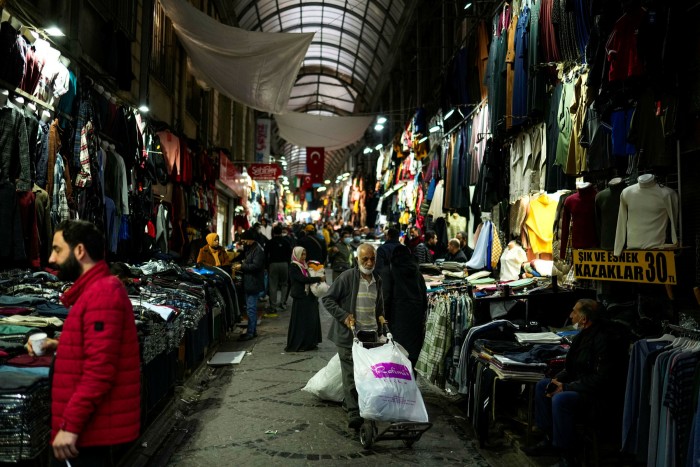Turkish opposition leader helps shape unlikely alliance to challenge Erdogan
For years, Turkish opposition leader Kemal Kilicdaroglu suffered ridicule for his mild-mannered demeanour and failure to make inroads at election after election. Lately, though, the head of the Republican People’s party (CHP) has discovered a taste for boldness.
On Friday, he turned up uninvited at the country’s statistical agency and accused it of manipulating inflation data under the orders of Recep Tayyip Erdogan, Turkey’s president. Standing outside its locked gates after being refused a meeting, he starkly warned the country’s civil servants to “do the right thing”.
With the country gripped by economic turmoil, a plunging currency and double-digit inflation, Kilicdaroglu has been buoyed by polls showing that the combined votes of the opposition alliance that he helped to build are higher than those of Erdogan and his allies. The loose coalition is convinced that it could topple the president in a national vote scheduled for 2023, but which could be called earlier.
“We have . . . a government that has seriously lost its capacity to govern,” Kilicdaroglu, a 72-year-old former bureaucrat who has led the CHP for more than a decade, told the Financial Times. “A large segment of society has embraced the idea that these people are on their way out.”
Kilicdaroglu is not an obvious leader of the opposition’s improbable alliance of nationalists, Kurds, leftists, rightwingers, secularists and religious conservatives.
The CHP that he leads was established by the country’s founding father Mustafa Kemal Ataturk and has long been seen as a standard bearer for secularism, bringing it into conflict with Turkey’s conservatives. Describing itself as social democrat, the CHP also has a strong nationalist vein that has alienated the country’s millions of Kurds.
But after years of failing to dent the popularity of Erdogan, whose Justice and Development party (AKP) has ruled for almost two decades, Kilicdaroglu has emerged as the architect of the unlikely grouping now challenging Erdogan’s grip on power.
The coalition began in 2017 when rival parties buried their differences to campaign together for a “no” vote in that year’s referendum on abolishing the country’s parliamentary system and consolidating the president’s control.
Their side narrowly lost, but the campaign laid the ground for further collaboration. This bore fruit two years later when the opposition’s unity candidates won mayoral elections in Istanbul and Ankara, ending 25 years of dominance by Erdogan and his allies over Turkey’s two biggest cities. Since then, Kilicdaroglu has carved out a role as a go-between with six other parties.
The president has attempted to break the alliance by exploiting its ideological faultlines. But the grouping has so far hung together by uniting behind a call for Turkey to return to a parliamentary system and by focusing on the state of the economy.
Inflation that has risen above 20 per cent, combined with the collapse in the Turkish lira, which has lost nearly half of its value against the dollar this year, have contributed to an erosion of the AKP’s popularity. The party’s vote share now hovers somewhere above 30 per cent, according to polling — down from a peak of almost 50 per cent in the 2011 elections.
“There’s huge unemployment, life is expensive, people cannot make ends meet,” said Kilicdaroglu, who has repeatedly called for early elections so that the public can issue their verdict on Erdogan’s economic management. “People are looking for a way out. Naturally, the way out is through politics.”
Analysts warn that the increasingly authoritarian Erdogan might not go quietly if he lost the vote. They point to the Istanbul mayoral contest in 2019, when the president cited fraud and cancelled the results after opposition challenger Ekrem Imamoglu won.

Kilicdaroglu waves away such concerns. Pointing to the public backlash against Erdogan’s decision to rerun the Istanbul contest, which resulted in an opposition landslide in the second vote, he said the president would have to leave power peacefully if defeated. “Istanbul was a trial run,” he said. “He will not want to leave power, but we will get him out.”
Erdogan’s supporters also had nothing to fear from an opposition victory, he said: “We will not run the country with malice, anger and revenge.”
Conscious of the CHP’s troubled reputation among conservatives, Kilicdaroglu last month made a plea for forgiveness for the party’s past mistakes, such as its opposition to women wearing the headscarf.
Despite such overtures, a recent survey by the Turkish pollster Metropoll found that almost 70 per cent of AKP voters, many of them devout Muslims, were fearful of the prospect of a government comprised of the CHP and its allies from the rightwing nationalist IYI party.
Some of the CHP’s key policies are also contentious internationally, including a pledge to reconcile with Bashar al-Assad, Syria’s president, and return Turkey’s 3.6m Syrian refugees.
The opposition could also trip itself up, analysts warn. Some within the CHP worry that Kilicdaroglu will suggest himself as the best candidate to challenge Erdogan for the presidency, despite polling showing that he would be less popular than Imamoglu or Mansur Yavas, Ankara’s mayor.
Kilicdaroglu refuses to rule out the prospect of a presidential run. But for now, he said, the opposition should focus on the country’s economic problems. “There’s a fire in the kitchen,” he said. “Everyone is desperately looking for an escape route.”
For all the latest Business News Click Here
For the latest news and updates, follow us on Google News.
